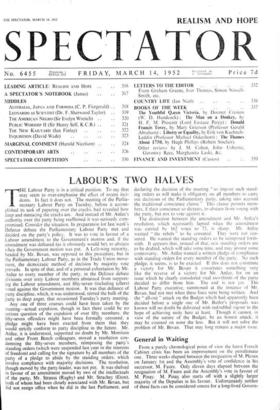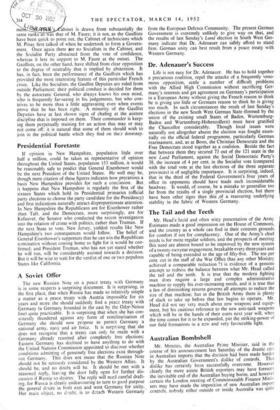General in Waiting
From a purely chronological point of view the latest French Cabinet crisis has been an improvement on the penultimate one. Three weeks elapsed between the resignation of M. Pleven on January 1st and the Assembly's vote of confidence in his successor, M. Faure. Only eleven days elapsed between the resignation of M. Faure and the Assembly's vote in favour of M. Pinay. M. Pinay also starts off with a slightly larger majority of the Deputies in his favour. Unfortunately neither of these facts can be considered omens for a long-lived Govern- me 4/19RAFR abinet is drawn from substantially the same ranks as was that of M. Faure; it is not, as the Gaullists have been quick to point out, the Cabinet of technicians .which M. Pinay first talked of when, he undertook to form a Govern-. ment. Once again there *re no Socialists in the Cabinet, and the Socialist Party abstained from the vote of confidence, whereas it lent its support to M. Faure at the outset. The Gaullists, on the other hand, have shifted from clear opposition to the degree of neutrality that is implied by abstention. It has, in fact, been the performance of the Gaullists which has provided the most interesting feature of this particular French crisis. Like the Socialists, the Gaullist Deputies are ruled from outside Parliament; their political conduct is decided for them by the autocratic General, who always knows his own mind, who is frequently far-seeing in his judgements, but who con- trives to be more than a little aggravatihg even when events prove that he has been right. A minority of the Gaullist Deputies have al last shown signs of chafing at the austere discipline that is imposed on them. Their commander is keep- ing them perpetually training for an action that may or may not come off; it is natural that some of them should wish to join in the political battle which they find on the:r doorstep.











































 Previous page
Previous page